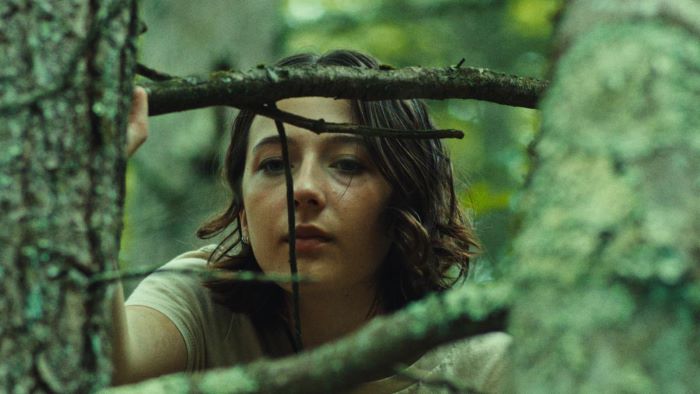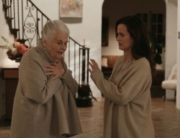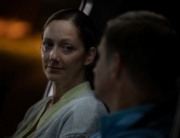![]() The mystique of the fortune teller lies in the perception of an exotic and supernatural power: wisdom divined from a far-off world. Typically, this arbiter of wisdom is a highly attuned woman, one accustomed to observation and insight based on a strong sense of intuition. In Good One, 17-year-old Sam (Lily Collias) takes up the fortune teller’s mantle for those seeking guidance: her semi-estranged father, Christopher (James Le Gros), and his friend Matt (Danny McCarthy). The film is told through her perspective as a detached observer on a journey with two men for whom she is an alien. Hers is a lonely gaze that is mirrored and heightened by writer/director India Donaldson’s subtle and attentive camera.
The mystique of the fortune teller lies in the perception of an exotic and supernatural power: wisdom divined from a far-off world. Typically, this arbiter of wisdom is a highly attuned woman, one accustomed to observation and insight based on a strong sense of intuition. In Good One, 17-year-old Sam (Lily Collias) takes up the fortune teller’s mantle for those seeking guidance: her semi-estranged father, Christopher (James Le Gros), and his friend Matt (Danny McCarthy). The film is told through her perspective as a detached observer on a journey with two men for whom she is an alien. Hers is a lonely gaze that is mirrored and heightened by writer/director India Donaldson’s subtle and attentive camera.
The film jumps right into teenaged Sam’s trek to upstate New York with her divorced father, Chris, and the soon-to-be divorcé Matt. The awkward trio form a lopsided dynamic as they spend three days in the woods together. The screenplay does little to divulge the character’s backstories, instead drawing them out through subtle details. Soon after Sam and Chris meet up, they pick up Matt from his apartment, where he is embroiled in a family drama with his son. From her first encounter with Matt, Sam feels isolated. She finds herself with two men who, in spite of their age, are worse at communicating than she is.
The two adults perpetually misinterpret and caricature Sam, seeing her through a series of clichés. Matt, in particular, has a habit of projecting ideals and stereotypes onto those around him. He deems Sam to be a “good one”—unexpectedly wise for her age—and congratulates Chris for the daughter he raised. Ironically, Chris seems to have not been in touch with her recently. In a telling scene, he insists his daughter is vegetarian, while Sam counterclaims she never has been. Yet the two men don’t hesitate to exploit her good counsel. Chris asks her to deal with his customers from work while the self-pitying Matt coerces Sam into trying to reconcile his guilt over the mistakes of his past. In turn, she also becomes a referee: Chris, unable to confront his resentment toward Matt, judges him for his lapses and creates further tension. Meanwhile, Matt makes a fool of himself through self-sabotage, all the while making nonsensical and vapid conversation. As a result, Sam finds herself trying to mediate a common ground between the clashing egos of two men with strong opinions. The filmmaker hints at what life might have been like for her during her parent’s divorce in these moments. Her “wisdom” is no trick, but comes from an observational nature and navigating her parents’ divorce.
Closer to the end as conflicts rise, Sam and her father experience an unfortunate miscommunication and breach of trust. Sam’s perspective changes as a result of this altercation, and the tone shifts with her, going from a hangout film to a tense drama. The resulting confrontation manages not to be melodramatic or manipulative, but truthful and touching. The chemistry between the actors Collias, Le Gros, and McCarthy feels so organic that not a single exchange feels forced, each of them elevating the excellent writing. Collias, in particular, delivers a nuanced and honest performance. India Donaldson universalizes Sam’s personal experience, carefully building a work embodying feelings that many young women can resonate with and recognize within themselves.

















Leave A Comment